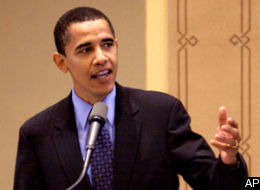This post is the second in a series. Read the first part here.
 President Obama’s “Address to the Nation on the End of Combat Operations in Iraq,” was consistent with his first public speech expressing his opposition to the war. He stood by the same principles, as he was fulfilling his responsibility as head of state, President for the entire nation and not only those who support him and his partisan position. To paraphrase one of his standard lines, he was not speaking as President of the Blue States or the Red States, but as President of the United States of America. The night of the address and in the days that followed, this most basic quality of his speech was overlooked. Instead, there were misleading interpretations, from Obama’s critics and his supporters, revealing a fundamental problem in our public life.
President Obama’s “Address to the Nation on the End of Combat Operations in Iraq,” was consistent with his first public speech expressing his opposition to the war. He stood by the same principles, as he was fulfilling his responsibility as head of state, President for the entire nation and not only those who support him and his partisan position. To paraphrase one of his standard lines, he was not speaking as President of the Blue States or the Red States, but as President of the United States of America. The night of the address and in the days that followed, this most basic quality of his speech was overlooked. Instead, there were misleading interpretations, from Obama’s critics and his supporters, revealing a fundamental problem in our public life.
The Partisan Interpretations
From his partisan opposition, the criticism was strong. <<Obama should have declared victory,>> Senator John McCain and his interviewer Sean Hannity, agreed. (video) He should have given President Bush full credit for the victory. He should have apologized for his opposition to the surge. Lindsey Graham concurred and was particularly critical that Obama did not acknowledge the terrorists’ defeat and the need to extend our momentum in Afghanistan. (video) The emphasis on withdrawal instead of victory was the fundamental problem with the President’s speech. “It’s not about when we leave in Afghanistan. It’s about what we leave behind.” Charles Krauthammer, in the instant analysis following the speech on Fox News, observed that the speech was “both flat and odd.” Flat, because it did not celebrate the victory, but rather emphasized the withdrawal almost as a lamentation. Odd, because of the way he linked his topics, from Iraq to Afghanistan to, most disturbing for Krauthammer, tacking on an “economic pep talk.” There should have been a coherent speech about our missions abroad. Instead there was a speech by a man who is only interested in his domestic agenda. (video) And from his partisan supporters there was also serious criticism, mirroring the rage on the right. <<Obama should have declared defeat,>> Frank . . .
Read more: The End of the Iraq War
